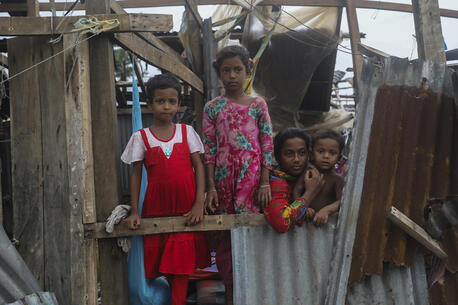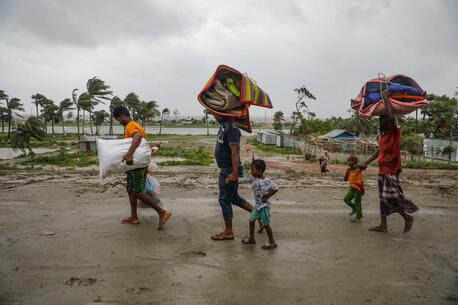
Powerful Cyclone Hits India, Already Reeling From COVID-19 Outbreak
As India battles a ferocious, months-long second wave of COVID-19 cases, a deadly new disaster strikes: Cyclone Tauktae.
Cyclone Tauktae — an "extremely severe" storm with sustained wind speeds up to 100 miles per hour — made landfall in India's western state of Gujarat early on Tuesday morning, May 18, killing more than 12 people and leaving a trail of destruction in its wake.
The cyclone's high winds and torrential rains have been battering the coastal states of Kerala, Karnataka, Goa and Maharashtra, causing intense flooding and forcing the evacuation of 200,000 people in low-lying areas. State and district-level government officials have initiated intensive cyclone preparedness and response plans to protect those who are at risk and in need of humanitarian assistance. UNICEF is responding to the cyclone in partnership with the interagency group of Gujarat as well as supporting the government response.
First, a brutal second wave of COVID-19 hits India. Now, a killer cyclone
This unusually powerful storm — the strongest to hit the region since 1998 — has arrived at an extremely inopportune time. Since February 2021, India has been battling skyrocketing numbers of COVID-19 cases. The global epicenter of a ferocious second wave of COVID-19, India has reported approximately 25 million cases and more than 274,000 deaths to date.
UNICEF is already on the ground in Gujarat and 16 other states in India, responding to the COVID-19 crisis. UNICEF has been working with partners to support critical frontline health workers and rush desperately needed oxygen and other lifesaving supplies to hospitals buckling under the strain of caring for so many severely ill patients.
When disasters strike, UNICEF is on the ground, ready to respond
Early reports indicate that a bulk oxygen manufacturing facility in the town of Jamnagar, Gujarat may have been in the path of Cyclone Tauktae. If the facility was damaged or destroyed, the oxygen supply line to a number of states may be disrupted. States have been advised to maintain a buffer of two days' supply of oxygen.
When disasters strike, UNICEF is on the ground, ready to respond. Your generous contribution can help save lives.
Top photo: Cyclone Tauktae came ashore in India's western state of Gujarat in the early hours of May 18, 2021. © NASA Earth Observatory Image
HOW TO HELP
There are many ways to make a difference
War, famine, poverty, natural disasters — threats to the world's children keep coming. But UNICEF won't stop working to keep children healthy and safe.
UNICEF works in over 190 countries and territories — more places than any other children's organization. UNICEF has the world's largest humanitarian warehouse and, when disaster strikes, can get supplies almost anywhere within 72 hours. Constantly innovating, always advocating for a better world for children, UNICEF works to ensure that every child can grow up healthy, educated, protected and respected.
Would you like to help give all children the opportunity to reach their full potential? There are many ways to get involved.




